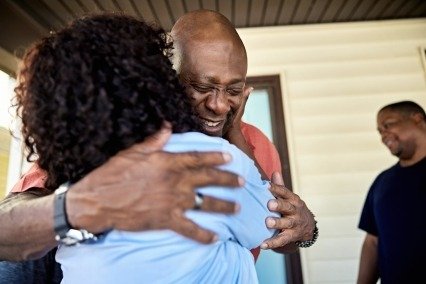Native Americans have created an evidence based curriculum entitled, The Seven Teachings of the Grandfather. The curriculum is used to help Native Americans return to the culture that was stolen from them by European colonialists. The theft of their culture led to one of the highest rates of alcoholism in the world. Programs like the Native American Wellbriety Movement and the Seven Teachings of the Grandfather are excellent examples on how culture can be a recovery catalyst and substance use disorder prevention tool. Today, there are Native American tribes achieving 40% to 70% recovery rates.
I am reflecting on these trying times as Donald Trump, the President of the United States is using ICE and threatening to use the military to traumatize Black and Brown communities. One colleague told me, "The president is terrorizing so many children he might be producing the next generation of heroin users to cope with the trauma." He has also rolled back affirmative action which was never meant to be a quota system. It was meant to give African Americans a chance to compete as they were systematically excluded from competing.
What lessons did my grandparents teach that might help us deal with these trying times today? Two lessons come to mind.
"To achieve success, you can't be as good as the white man, you have to be twice as good!"
My friend Oliver Singleton used to say, "If affirmative action is about hiring unqualified people, white males have created the most successful affirmative action program in history. Look at the president’s cabinet appointees. He fired the Joint Chief of Staff, Air Force General, Charles Brown Jr., an African American with a 40 year stellar military career and replaced him with Pete Hegseth, a Fox News Weekend TV Host. He appointed. RFK Jr. as Secretary of Health and Human Services who said Tylenol was the cause of Autism, spread misinformation on vaccines, then Texas experienced an immediate measles outbreak. There has not been a measles outbreak in the U.S. in over 3 decades. Linda McMahon has a degree in French, has never worked in education and was chosen to be the Secretary of Education.
These appointees clearly reveal, my grandparents were correct. We have to be twice as good! When this lesson was loudest, our community produced some of the most successful humans (people) who ever inhabited earth, including: Madam C.J. Walker, Frederick Douglass, W.E.B. Dubois, Ida B. Wells, Dr. Martin Luther King Jr., Malcom X, Jackie Robinson, Maya Angelou, Nikki Giovanni, Dr. Mae Jemison, Dr. Neil DeGrasse Tyson, Michelle Obama, Spike Lee, Denzel Washington, Viola Davis etc, Striving For Greatness is substance Use disorder prevention in action. Working to be twice as good, yields great outcomes. Racism might stop some of us from reaching the moon. In the words of Dr. Norman Vincent Peale, “Shoot for the moon and if you miss, you'll land Among the stars!”
2. Stay in School! As a boomer, my generation of African Americans will tell you that the only way our parents would allow us to miss a day of school was if we were dead. They were taught this by our grandparents. Most of our grandparents were raised in the Jim Crow South, a few generations after the end of Chattel slavery. An important lesson from slavery, In order to keep a slave a slave you could never teach him to read. My grandmother had vision challenges, grew up in Arkansas and had to drop out of school in 3rd grade because her family could not afford glasses in order for her to read. She spent her grade school and high school years picking cotton. When I lived with her I was never allowed to miss a day of school.
Today, there are generations of African American children and adolescents who have dropped out of grade school and high school. Generations of parents have dropped the ball in teaching the lesson of our grandparents, Stay in school! Dropping out of school increases the risk of early juvenile justice involvement, early substance use, felony arrests and difficulty securing employment.
There is a National College Dropout Hall of Fame. It features prominent billionaires like Bill Gates, Steve Jobs and Mark Zuckerberg. There is no High School Drop Out Hall of Fame! Not everyone will graduate college, across all cultural groups in the U.S. You must graduate high school! In this era of AI and other advanced technology, 8 out of 12 jobs in the future will require at least a high school diploma. As a harm reductionist, my work with African American adolescents with substance use challenges, I place completion of high school above permanent abstinence by age 18. Jails and prisons are filled with high school dropouts. How do we increase high school graduation rates!
Use best practices to increase the number of African American children who are able to read at an early age. This requires a study of best practices. One strategy is to have parents and high school students read to younger students. I am also in agreement with James Patterson. “There is no such thing as a person who does not love to read. They have not discovered what they love to read yet!”
Use advocacy and other strategies to improve the quality of elementary school education in African American communities. Creative strategies are also needed. Gary Comer, Founder of Land’s End provided computers for students in the elementary school he attended on the Southside of Chicago. His foundation later opened a successful primary school with predominantly African American students.
Urban Prep, also on the Southside of Chicago has a ritual where the students begin their school day reciting a group pledge affirming they with graduate high school and attend college. They consistently achieve a 100% high school graduation rate and nearly all of their students go on to college. All African American males.
Return to the teachings of the grandparents. As a collective community it is important to impart the teachings of our grandparents to the current and future generation of African American children. You have to be twice as good and stay in school. Then, our next task is to help them succeed.
























